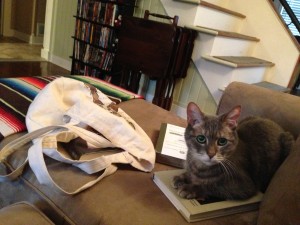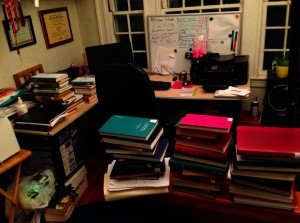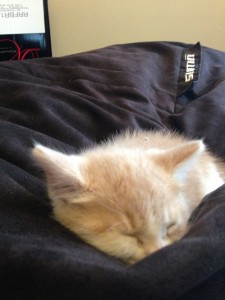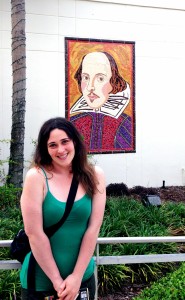As we launch into August, it has come to my attention that I will have to take the comprehensive exam.
“Well, duh!” You say, “Isn’t that what you’ve been studying for since June? Isn’t that the cause of your extreme stress, and the true root of every single nightly anxiety dream you’ve been experiencing? Don’t you already know this?”
…yes, I know this. In theory. Comps, much like any other part of this process of becoming, is something that is effectively fiction until it’s reality. You know that it’s listed as a degree requirement in the Graduate Student Handbook, you see its wake in the eyes of your senior colleagues, you understand that it is a thing that does happen, but until you have some confirmation that it will happen to you it still seems like you roommate’s imaginary Boyfriend who lives in Canada*.
For me, the concrete proof came in an e-mail from our department admin this week announcing the dates of the exam, some details about the exam, and the locations where we will each be subject to our individual torture hell anguish trial. This, combined with the realization that it is, in fact, August and thereby the summer will, at some point, end has added some heat to the proverbial fire and kicked my already-overblown stress level into overdrive. The anxiety dreams have gotten more pressing (though, sadly, more routine and so affect me less when I wake up), the fatigue has gotten more dragging, and the day-to-day realities of comps studying have

Another cute picture of a cat that’s not mine with books that are mine.
gotten more mind-numbing. I’d love to say I was in the final stretch, but I’m really only cresting the mid-point. I’ve got about a third of the way left to go.
This in mind, I would like to take a moment to address the care and feeding of your beloved PhD student. If you’re reading this, there is (in some capacity) someone in your life who has, will, or is gone through or going through this process. As such, please bear in mind the following fundamental truths of comps studying:
Truth the first: every small adjustment, change, or mishap is suddenly a GIANT CALAMITY. Right now, there are very few things that we can control. Changing a SINGLE THING which falls inside that realm is simply disastrous. In the past week, I’ve burst into tears over eggplant because it wasn’t in the fridge when I expected it to be. No joke. Treat your PhD student gently and if something ABSOLUTELY HAS TO CHANGE, make sure it has the smallest effect on his/her existence.
Truth the second: We don’t have enough hours in our day. Do not expect us to go above and beyond for anything right now (note: “above and beyond” can just mean “hey, can you take out the trash AND recycling because of completely reasonable reason y?” See truth the first for further explanation on this point). Also, do not expect us to be capable of organizing, planning, being in charge, helping, assisting, or taking care of anything no matter how menial it may seem. We simply can’t do it.
Truth the third: Small words. Please. Use small words. And unless you’re talking to us about our field, don’t expect to engage us in any conversation that requires more than grunts, nods, or Neolithic fist pounding. If you do expect such engagement, also expect that we will almost immediately find a way to turn the conversation back to whatever it is we’re studying. Example: I found clear references to eighteenth century acting technique in Pixar’s Monster’s University. When my companion asked what I thought of the film, it was about all I had to add to the conversation.

and another picture of my desk. This time in PANORAMA!
Truth the fourth: Any small kindness will be taken as earth-shatteringly wonderful. This includes meal-cooking/meal-providing, hugs without conversation, and pretty much any unobtrusive reminder that you’re there, you love us, and you understand we’re going through a rough time but don’t worry it’ll get better soon.
Truth the fifth: Treat plan-making with us as a precarious process which may or may not come to full fruition, and please PLEASE don’t take it personally when we have to stay home and read, work late for some reason, etc. This also includes unanswered/unreturned texts or phone calls. We still love you and we promise that we’ll get back to you come September when this ordeal has come to its inevitable conclusion.
Truth the sixth: As odd as this may look from the outside, this is a life-changing process which (literally) determines the fate of our future. Our entire careers will be changed by the outcome of this exam. Dealing with that reality every day is daunting, dizzying, and frankly terrifying. We are essentially training our brains to think like professional academics and this is something we will use for the rest of our lives. Please don’t compare our stress over this to your bad day at work, the failures of your dating life, or burning dinner. It will just make us angry and frustrated that you don’t really understand what we’re going through.
Truth the seventh: Pretty much just treat us like cranky three-year-olds and you can’t go wrong. Simple things that provide amusement are appreciated, tasty treats will always be greeted with gratitude, ignoring us when we’re having a temper tantrum is perfectly acceptable.
I assure you, we will repay the favor tenfold when we’re no longer living in the seventh circle.
*Please Note: My current roommate doesn’t have one of these, but I understand from contemporary satire (i.e. Avenue Q.) that it could be a thing which a hopelessly single person might say in order to convince his/her friends that he/she is not, in fact, hopelessly single.




